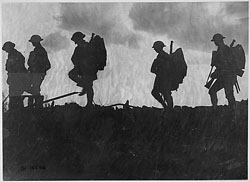Why study World War One?
First, it was the event that set the tone of the 20th century more than any other event. Communism in the USSR, Fascism in Italy and Germany, and the rise of the United States as a superpower and the corresponding weakening of Europe were all direct products of the First World War.
Second, there is much that this event can teach us. Part IV of the FAQ deals with some lessons that it illustrates. Unlike World War II, World War I seemed to happen spontaneously. Similarly, with the partial exception of the United States every participant in the war suffered and was weakened. Studying this may help us avoid no-win situations in the future.
Third, such a cataclysmic event is rapidly being forgotten. Today the number of surviving veterans is under a thousand, and soon there will be none. While World War 2, with its diabolical Nazi and Imperial Japanese opponents, and clear-cut victory, is still well known in the mainstream culture, most educated people know terribly little about the First World War. Such an important event does not deserve to be forgotten.
Disclaimer
 This World War One FAQ is not an academic piece: I have not taken the time to footnote every fact. If you want to know why I make a given statement please contact me and I will reply to your query. Similarly, if you ask a good question, I may add it to the FAQ.
This World War One FAQ is not an academic piece: I have not taken the time to footnote every fact. If you want to know why I make a given statement please contact me and I will reply to your query. Similarly, if you ask a good question, I may add it to the FAQ.
It is meant to give the reader a basic understanding of the war. It is not a history per se, and there are many things that are not covered. However, it answers some basic questions which those with little knowledge of the war may have.
Part One covers the basic history and war plans of the participants in WWI. Part Two A and B describes some important aspects of the fighting. Part Three covers the end of the war. Part Four details some lessons I see relevant for today.
